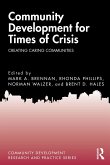This book focuses on a gap in current social work practice theory: community change. Much work in this area of macro practice, particularly around "grassroots" community organizing, has a somewhat dated feel to it, is highly ideological in orientation, or suffers from superficiality, particularly in the area of theory and practical application. Set against the context of an often narrowly constructed "clinical" emphasis on practice education, coupled with social work's own current rendering of "scientific management," community practice often takes second or third billing in many professional curricula despite its deep roots in the overall field of social welfare.Drawing on extensive case study data from three significant community-building initiatives, program data from numerous other community capacity-building efforts, key informant interviews, and an excellent literature review, Chaskin and his colleagues draw implications for crafting community change strategies as well as for creating and sustaining the organizational infrastructure necessary to support them. The authors bring to bear the perspectives of a variety of professional disciplines including sociology, urban planning, psychology, and social work.Building Community Capacity takes a collaborative, interdisciplinary approach to a subject of wide and current concern: the role of neighborhood and community structures in the delivery of human services or, as the authors put it, "a place where programs and problems can be fitted together." Social work scholars and students of community practice seeking new conceptual frameworks and insights from research to inform novel community interventions will find much of value in Building Community Capacity.
Bitte wählen Sie Ihr Anliegen aus.
Rechnungen
Retourenschein anfordern
Bestellstatus
Storno








